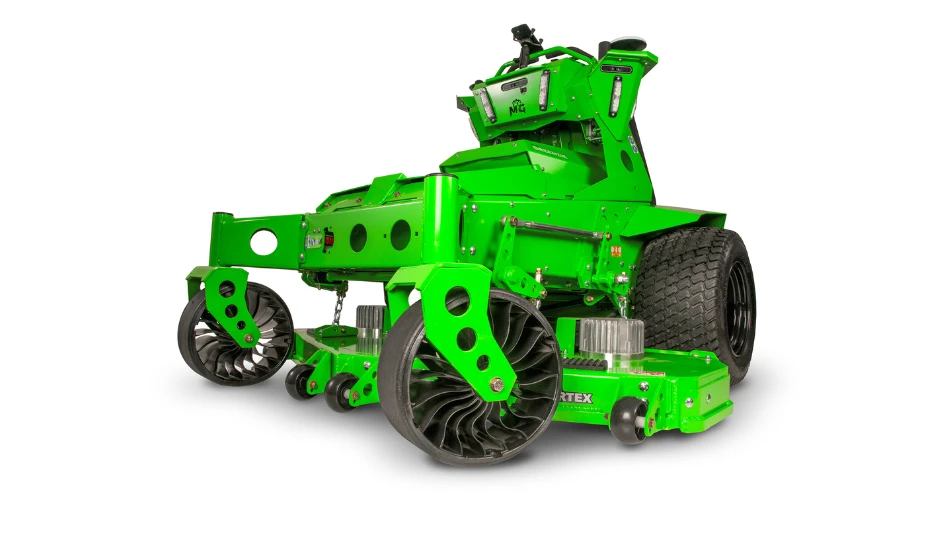 Bland has moved away from commercial design/build and diversified services. Bland has moved away from commercial design/build and diversified services. |
Kurt Bland was acutely aware of how poorly a large client was treating his employees who were stationed five days a week on the commercial property in town.
He was blind-copied on emails from the owner that “blasted” his employees. His workers were being falsely accused on a daily basis. There was complete lack of respect for their effort and talent.
Bland, president of Bland Landscaping in Apex, N.C., saw the tension building for six months. And he just didn’t feel good about any of it – the client, the job, the way his employees were being treated. His business was facing a dip in morale because of a client that couldn’t be pleased.
So when the three-year contract was about to expire and the property owner announced that 10 other companies would be bidding on the job, Bland politely declined the opportunity. “Unless there was a substantial change in their organization and how they managed their vendors, we didn’t want to be involved,” Bland says.
You have to draw the line somewhere, even if that means losing money – even in a recession. “That’s a really hard thing to do,” Bland says. “You see revenues declining and in a recession where you are losing construction revenue and finding opportunities to diversify. It was a big fish to not even throw a hook at.”
But Bland’s employees were involved in the decision. “I spoke to them candidly about it, and I was involved behind the scenes so I was empathetic to what they were going through and trying to manage that situation,” he says. Essentially, that particular work site had become a toxic environment full of blame and bad feelings.
Sure, walking away from the bid opportunity cost Bland Landscaping a good $250,000; that’s how much revenue per year the company pulled in by servicing the account. But declining the bid process also showed employees that the company’s values are more important than a single job.
“It showed our people that even in difficult economic times, we are going to stand behind what we say,” Bland says.
“It’s important that at the end of the day, the work is something we can be proud of, and that everyone involved is treated with respect.”
 Integrity is one of those intangibles that could easily disappear from a company’s daily operations because there’s not necessarily a way to measure it.
Integrity is one of those intangibles that could easily disappear from a company’s daily operations because there’s not necessarily a way to measure it.
You can do good things, you can set a positive example, but there isn’t a performance meter attached to it – at least not directly.
But Bland Landscaping’s decision made an impact on judges at the Greater Raleigh Chamber of Commerce, which awarded the firm with the 2011 Integrity in Business Award.
The recognition honors stand-out companies that demonstrate dedication to corporate responsibility, integrity and ethics.
Focused on flexibility. “Like any successful company in any industry, the biggest key is to be flexible and not have a rigid approach to business,” Bland says.
Bland and his team have always relied on a strong moral compass to guide business operations. And the company has enjoyed a legacy of producing work that is highly regarded, earning more than 100 awards for excellence in commercial and residential landscape.
But what has changed drastically in the last decade is the company’s service mix.
What was a company steeped in commercial landscape design/build, mainly for Class A office space, has evolved into a firm focused mostly on maintenance.
Design/build now represents only about 15 percent of the business, which is about $1-2 million per year, depending on the projects.
The company does not take on projects that are publicly funded or performed for general contractors (with the exception of a few GCs Bland has formed trusting relationships with over the years).
Rather, the firm has a handful of substantial residential projects on the docket and runs six landscape installation and enhancement crews, one of which is stationed full-time on a private estate that is a commercial-scale property.
“So, it’s not the traditional bread-and-butter that, for years, our brand was built on,” Bland says, relating that the commercial design/build work the company once majored in is “gone.”
Besides, in what Bland describes as a “ridiculously competitive bid market” it doesn’t make good business sense for Bland Landscaping to focus on commercial design/build jobs
The company’s bottom line was preserved through a consorted shift into commercial maintenance and a focus on boutique and specialized design/build projects such as memorial gardens.
“I personally enjoy construction, the whole process, everything about it – it’s my passion,” he says. “But as a businessperson, I don’t like it so much.
“In terms of a business owner trying to build something that continues to grow in value and doesn’t fluctuate wildly with the economy, our business depends on maintenance.”
For more Business Builder, visit www.lawnandlandscape.com/newsletters.
|
Triple play Sponsored Content A Secret Weapon for Growing Your Lawn Care BusinessRetargeting ads allow you to re-engage visitors who leave your lawn care website without converting, helping you stay top-of-mind and increase leads. This article explains how retargeting works, why it’s effective, and how to implement it for your business. Complete Online Marketing SolutionsA focus on the triple bottom line makes people, planet and prosperity top of mind at Bland Landscaping. Environmental responsibility isn’t something Kurt Bland wants to necessarily measure. “I don’t have a carbon emissions calculator,” he says. “And our employees volunteer, but that’s an honor system. I don’t track their hours.” But Bland’s practical approach to sustainability is no less of a commitment to doing good. It’s just that he recognizes that his company must be profitable so it can do more good – the basis of a triple bottom line (TBL) approach to business. “The profit element has to come first, and that enables you to do good things,” he says. But sometimes you make decisions because your gut tells you that mindfulness outweighs money. Take Bland’s choice to use alternative biodiesel oil rather than regular gasoline, which costs about 20 cents less per gallon. For a company that uses in excess of 120,000 gallons of fuel per year, the price difference is not a number to ignore. “While we are feeling the economic pressure, a banker or purist (in economics) would say, ‘That is foolish. You need to go back to using plain, old petrol diesel,’” Bland says. “But biodiesel is something I believe in and my business partners – my dad and brother – believe in it, too.”Every decision can’t be profit-driven. But then again, if there isn’t profit there to play with, there are few decisions to make. “We can’t lose sight of how our decisions affect other people and the economy and the community,” says Bland, essentially summing up the people-planet-profit premise of TBL. As for the planet portion, Bland Landscaping was one of the first companies, and the very first business in the green industry, to earn Green Plus Certification through The Institute of Sustainable Development in Chapel Hill, N.C. The certification demonstrates a commitment to TBL and is essentially a curriculum owners work through on the road to bettering their businesses. It involves a questionnaire and activities designed to improve the bottom line, overall efficiency of the business and, ultimately, help create a more sustainable company. For Bland, the sustainability factor was pretty much ingrained in the business; the certification just made it official. “I believe that most business owners aspire to own and operate a responsible business,” he says. “Some of them may not have the knowledge or tools or expertise to earn themselves more recognition, but at the end of the day, I think people are inherently good and because of that, they will make responsible decisions when running their businesses.” |
Get curated news on YOUR industry.
Enter your email to receive our newsletters.
Explore the October 2012 Issue
Check out more from this issue and find your next story to read.
Latest from Lawn & Landscape
- Connect, Control & Conserve with Horizon Technical Services
- Use Horizon's Parts Hotline
- How I built a Top 100 company
- Horizon’s Exclusive TurfGro Fertilizer
- Grow your business with mosquito control
- LandCare adds 2 branches in SoCal, promotes Aleman to branch manager
- Spray them away
- PERC helps debut propane direct-injection fuel system at ACT Expo 2025









